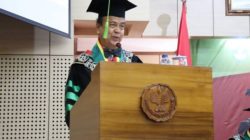Jakarta, Indonesia – Prof. Tjandra Yoga Aditama, a health specialist, has stated that strengthening education on monkeypox is critical in order to improve the community’s understanding of the infectious disease.
“Improving education is critical so that the community knows and collaborates with the government to take preventive steps,” he said when reached here on Friday.
Aditama, a former director of infectious diseases at the World Health Organization (WHO) South-East Asia who is now a professor at the University of Indonesia’s Faculty of Medicine, stated that education and information dissemination must be coordinated with the strengthening of the monkeypox surveillance system.
“So far, distribution and education efforts have been successful, but they must be improved in tandem with measures to strengthen surveillance,” he said.
He believes that the government’s efforts to prevent monkeypox should be commended.
“The government has taken swift steps to prevent the disease from entering numerous countries, especially those in the Asian region,” he said.
He stated that the government is now expanding the network of genetic sequencing research centers for monkeypox in ten major cities in Indonesia.
“This network growth is critical for helping the mitigation of monkeypox spread,” he said.
The professor went on to say that expanding the laboratory network must be supported by quality and management improvements.
Previously, Maxi Rein Rondonuwu, Director General of Disease, Prevention, and Control at the Ministry of Health, stated that all Environmental Health Engineering Centers (BTKLs) are being used as monkeypox laboratories.
“They are (distributed) in Medan, Palembang, Kalimantan, Banjarmasin, Yogyakarta, Surabaya, Jakarta, Ambon, Manado, and Makassar,” he explained.
Rondonuwu stated that the use of BTKLs in monkeypox virus research laboratories has expanded the network, which previously consisted of only two laboratories, namely the Primate Animal Study Center Laboratory in Bogor and the Prof. Dr. Sri Oemijati Infectious Disease Research Laboratory in Jakarta.
Source: Antara News





